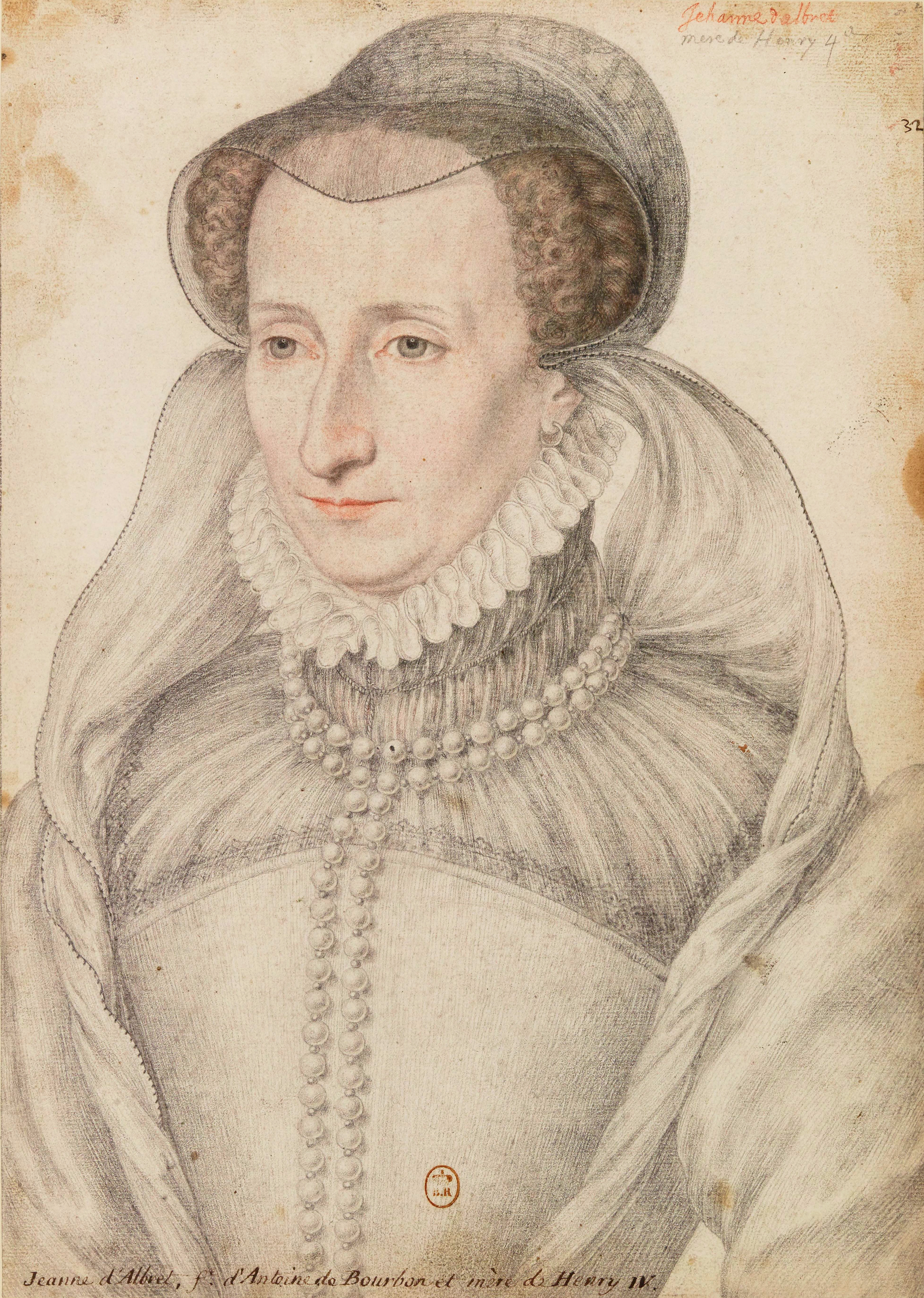
Jeanne d'Albret
Jeanne d'Albret (Basque: Joana Albretekoa; Occitan: Joana de Labrit; 16 November 1528 – 9 June 1572), also known as Jeanne III, was Queen of Navarre from 1555 to 1572.
Jeanne III
25 May 1555 – 9 June 1572
18 August 1555 at Pau
Antoine (1555–1562)
1555–1572
- Miquel Despuig (until 1556)
- Joan Pérez García de Oliván (1556–1560)
- Vacant (1560–1561)
- Pere de Castellet (1561–1571)
- Vacant (1571–1572)
16 November 1528[1]
Saint-Germain-en-Laye, Kingdom of France
9 June 1572 (aged 43)
Paris, Kingdom of France
Reformed (Huguenot),
prev. Roman Catholic
Jeanne was the daughter of Henry II of Navarre and Margaret of Angoulême. In 1541, she married William, Duke of Jülich-Cleves-Berg. The marriage was annulled in 1545. Jeanne married a second time in 1548, to Antoine de Bourbon, Duke of Vendôme. They had two surviving children, Henry and Catherine.
When her father died in 1555, Jeanne and Antoine ascended the Navarrese throne. They reigned as joint rulers until Antoine died from battle wounds in 1562. Jeanne was the acknowledged spiritual and political leader of the French Huguenot movement,[2] and a key figure in the French Wars of Religion. After her public conversion to Calvinism in 1560, she joined the Huguenot side. During the first and second war she remained relatively neutral, but in the third war she fled to La Rochelle, becoming the de facto leader of the Huguenot-controlled city. After negotiating a peace treaty with the French queen mother Catherine de' Medici and arranging the marriage of her son, Henry, to Catherine's daughter Marguerite, Jeanne died suddenly in Paris. Her son succeeded her as Henry III and later became the first Bourbon king of France as Henry IV.
Jeanne was the last active ruler of Navarre. Her son inherited her kingdom, but as he was constantly leading the Huguenot forces, he entrusted the government of Béarn to his sister, Catherine, who held the regency for more than two decades. In 1620, Jeanne's grandson Louis XIII annexed Navarre to the French crown.
Early years and first marriage[edit]
Jeanne was born in the royal palace of Saint-Germain-en-Laye, France,[3] at five o'clock in the afternoon on 16 November 1528,[3] the daughter of Henry II, King of Navarre, by his wife Marguerite of Angoulême.[4] Her mother, the daughter of Louise of Savoy and Charles, Count of Angoulême, was the sister of Francis I of France and had previously been married to Charles IV, Duke of Alençon. She was also a writer of some talent.
Jeanne's birth was officially announced the following 7 January when King Francis gave his permission for the addition of a new master in all cities where there were incorporated guilds "in honour of the birth of Jeanne de Navarre, the king's niece".[5] Since the age of two, as was the will of her uncle King Francis who took over her education, Jeanne was raised in the Château de Plessis-lèz-Tours in the Loire Valley (Touraine), thus living apart from her parents. She received an excellent education under the tutelage of humanist Nicolas Bourbon.[6]
Described as a "frivolous and high-spirited princess", she also, at an early age, displayed a tendency to be both stubborn and unyielding.[7] Charles V, Holy Roman Emperor, offered to have her married to his son and heir, Philip, to settle the status of the Kingdom of Navarre.[8] On 13 June 1541, when Jeanne was 12, Francis I, for political reasons, forced her to marry William "the Rich", Duke of Jülich-Cleves-Berg,[9] who was the brother of Anne of Cleves, the fourth wife of Henry VIII of England. Despite having been whipped into obedience,[10] she, nevertheless, continued to protest and had to be carried bodily to the altar by the Constable of France, Anne de Montmorency.[7] A description of Jeanne's appearance at her wedding revealed that she was sumptuously attired, wearing a golden crown, a silver and gold skirt encrusted with precious stones, and a crimson satin cloak richly trimmed with ermine.[11] Before her wedding, Jeanne signed two documents which she had officers of her household sign, declaring: "I, Jeanne de Navarre, persisting in the protestations I have already made, do hereby again affirm and protest by these present, that the marriage which it is desired to contract between the duke of Cleves and myself, is against my will; that I have never consented to it, nor will consent..."
Four years later, after the duke signed an agreement with Charles V to end his alliance with France in return for the duchy of Guelders, the marriage was annulled on the grounds that it had not been consummated and that Jeanne had to be forcibly married against her will. She remained at the royal court.